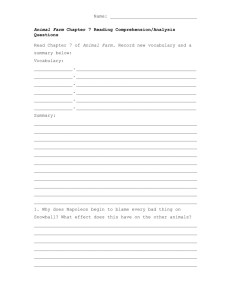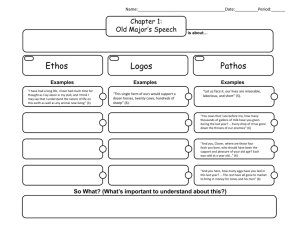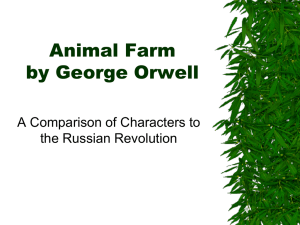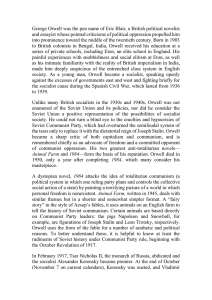Animal Farm
advertisement
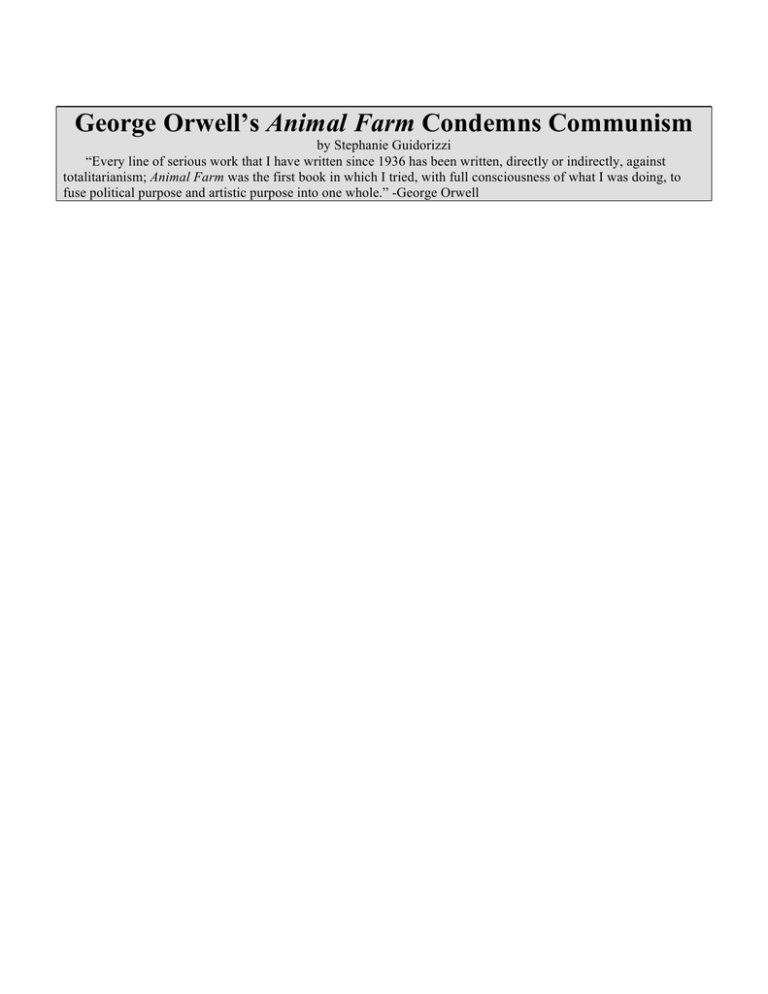
George Orwell’s Animal Farm Condemns Communism by Stephanie Guidorizzi “Every line of serious work that I have written since 1936 has been written, directly or indirectly, against totalitarianism; Animal Farm was the first book in which I tried, with full consciousness of what I was doing, to fuse political purpose and artistic purpose into one whole.” -George Orwell In 1917, the Bolshevik Party led by Nikoli Lenin overthrew Czar Nicholas II in Russia and the Communist Party gained control of the government. When Lenin died, Joseph Stalin and Leon Trotsky battled to be his successor. Stalin seized power and the idealism of the Revolution turned into a totalitarian system even more terrifying than the Czarist regime. Although he agreed with many Marxist principles, George Orwell uses his allegorical animal farm to satirize the Soviet system. Though the original intention of overthrowing Mr. Jones (the human farmer who represents the Czar), is not inherently evil in itself, Napoleon the Pig’s subsequent adoption of nearly all of Mr. Jones’ principles and harsh mistreatment of the animals shows that communism is but just another form of inequality. The pigs and dogs take most of the power for themselves, claiming they are the best administrators of government. Eventually power corrupts them, and they turn on their fellow animals. In the beginning of the novel, Old Major, the oldest Berkshire boar who represents Lenin, summoned all of the animals to assemble in the barn to relay a message to them. The message was simple: all animals are equal. This philosophy was the essential principal of Animalism. Humans are evil since they are the only creatures that consume without producing. “Your resolution must never falter. No argument must lead you astray. Never listen when they tell you that Man and the animals have a common interest. . . . we must not come to resemble him. . . . No animal must ever live in a house or sleep in a bed, or wear clothes, or drink alcohol, or smoke tobacco, or touch money, or engage in trade.” – Old Major Snowball, one of the successors of Old Major, believed that industry would put the farm on the map. He devised a plan for the windmill to cut labor in half while increasing production. The animals toiled night and day to erect the windmill. It was later destroyed by Napoleon, who was enraged that it was Snowball’s idea and not his. Eventually, Napoleon desired all of the power for himself and chased Snowball off the farm, an obvious reference to Stalin forcing Trotsky into exile. Napoleon acquired complete control over animal farm and ultimately became untouchable. “Do not imagine, comrades, that leadership is a pleasure. On the contrary, it is a deep and heavy responsibility. No one believes more firmly than Comrade Napoleon that all animals are equal. He would be only too happy to let you make your decisions for yourselves. But sometimes you might make the wrong decisions, comrades, and then where should we be?” - Squealer Censorship and propaganda are essential methods for manipulating the public. Squealer, a clever and persuasive speaker, represents Pravda, a propaganda-ridden Russian newspaper. Napoleon, the ruthless dictator of Animal Farm, had Squealer threaten the animals to sustain a sense of fear. The line often uttered by Squealer, “You don’t want Jones back, do you?” was the most effective way to ensure obedience by the other animals. Orwell made a profound effort to expose how “absolute power corrupts absolutely.” In the final chapter, Orwell stipulates, “The creatures looked from pig to man, and from man to pig, and from pig to man again; but already it was impossible to say which was which.” The irony of this novel is that the pigs were transformed into greedy and power-hungry humans, enforcing the former totalitarian government previously instituted by Mr. Jones. In the grand scheme of things, all living things compete in order to thrive according to Darwinian theory; communist ideals are unnatural and impractical. George Orwell’s satirical interpretation of the Russian Revolution helped many western intellectuals rethink their commitment to communist idealism. By the end of the Cold War between the Soviet Union and the United States, it was clear that capitalism and democracy would outlive a system of government-mandated equality.


